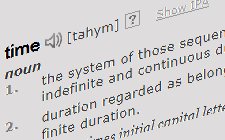Definition of Time

Time is something we deal with every day, and something that everyone thinks they understand. However, a compact and robust definition of time has proved to be remarkably tricky and elusive.
Short Definitions
Among the many short, snappy definitions of time that have been put forward are:
- what clocks measure (attr. to physicists Albert Einstein, Donald Ivey, and others)
- what prevents everything from happening at once (physicist John Wheeler and others)
- a linear continuum of instants (philosopher Adolf Grünbaum)
- a certain period during which something is done (Medical Dictionary)
- a continuum that lacks spatial dimensions (Encyclopaedia Britannica)
Although each of these definitions is fine as far as it goes, none of them feel wholly satisfactory.
Dictionary Definitions
Various dictionaries have defined time as follows:
- the indefinite continued progress of existence and events in the past, present and future regarded as a whole (Oxford Dictionary)
- the measured or measurable period during which an action, process or condition exists or continues (Webster’s Collegiate Dictionary)
- the continuous passage of existence in which events pass from a state of potentiality in the future, through the present, to a state of finality in the past (World English Dictionary)
- a continuous, measurable quantity in which events occur in a sequence proceeding from the past through the present to the future (Science Dictionary)
- the measured or measurable period during which an action, process or condition exists or continues (Merriam-Webster Dictionary)
- the dimension of the physical universe that orders the sequence of events at a given place (McGraw-Hill Encyclopedia of Science and Technology)
- a non-spatial system in which events appear to happen in irreversible succession (WordSmyth Dictionary)
- the inevitable progression into the future with the passing of present events into the past (Wiktionary)
- the indefinite continued progress of existence and events in the past, present, and future regarded as a whole (Google)
Perhaps the best and most comprehensive overall definition is that offered by Wikipedia:
- a dimension in which events can be ordered from the past through the present into the future, and also the measure of durations of events and the intervals between them
Different Aspects
Clearly time is not an object or substance we can touch or see. But neither is it merely a dimension, quantity or a concept. Indeed, time has many aspects and appears to represent different things to different people in different circumstances. A few examples of some of the different contexts in which the word time is used may serve to indicate just how flexible, multi-functional (and often vague) the word is :
- “Time stood still”
- “Excuse me, do you have the time”
- “It took a very long time”
- “Adolescence is a difficult time”
- “This is not the first time this has happened”
- “It’s time for dinner”
- “I don’t have time right now”
- “Clap in time to the music”
- “I had a good time last night”
- “He completed the race in record time”
- “Things were different in my time”
- “He should be doing time for such a crime”
In addition, time can even be used as an adjective (e.g. a time bomb, time signature) and as a verb (e.g. to time a race, to time an event).
Past, Present and Future
Another way of looking at time is as the totality of three separate elements: the past, the present and the future.
The past may be defined as those events which occurred before a given point in time, events which are usually considered to be fixed and immutable. It can be accessed through memory or, since the advent of written language, recorded history. The study of the past, in particular as it relates to humans, is called history.
The present may be defined as the time associated with the events perceived directly and for the first time, i.e. not as a recollection of the past or as a speculation of the future. It is equivalent to the word “now”, and is the period of time located between the past and the future. Just how long a period of time the present incorporates, however, depends on the context, and can vary from an infinitesimal or durationless moment to a day to a whole era, depending on how it is being used.
The future is the indefinite time period after the present moment. It is the portion of the projected time line that is anticipated to occur, and may be considered as potentially infinite in its extent, or as circumscribed and finite, depending on the context. While some people may see the future as fixed and predetermined, most see it as essentially unknown (and perhaps unknowable), and open to many different possibilities and permutations. The study of postulating possible, probable and preferable futures and worldviews is called futurology.